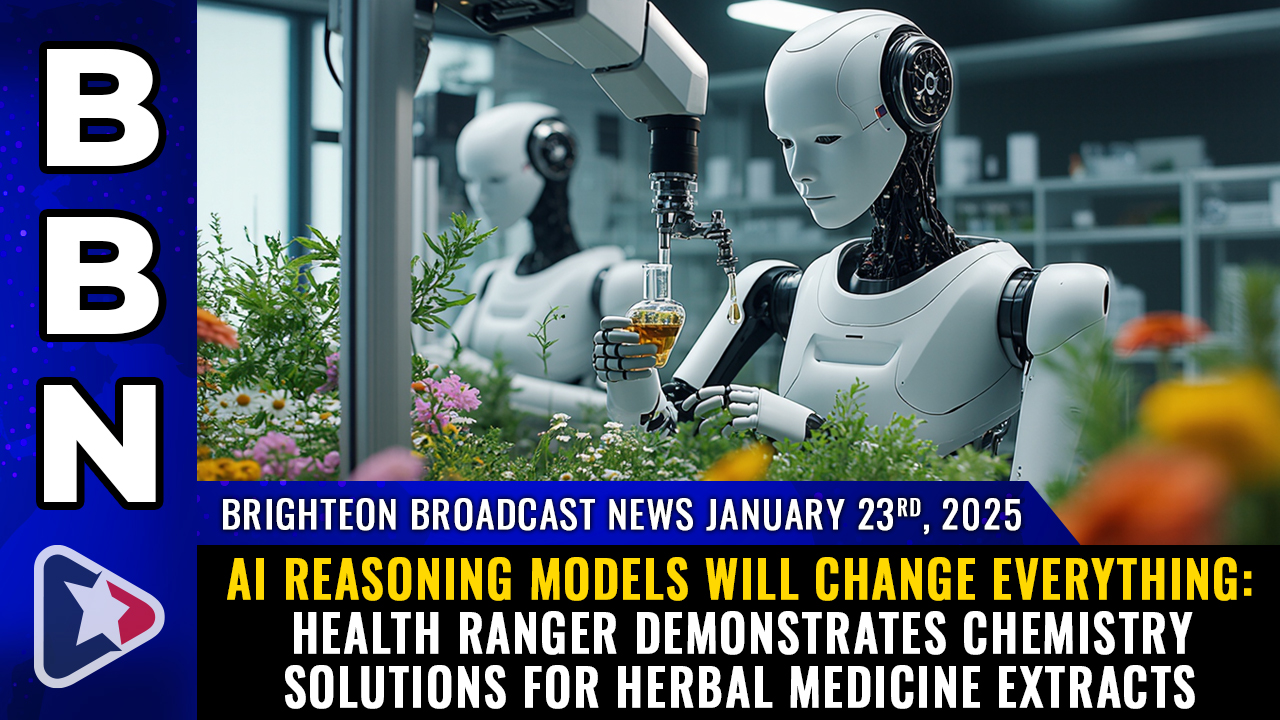AI revolution takes center stage as DeepSeek-R1 model demonstrates advanced reasoning capabilities
01/23/2025 / By Finn Heartley

- DeepSeek-R1, a 671-billion-parameter AI reasoning model developed by a Chinese company, has stunned experts with its ability to solve complex problems, from thermal calculations to policy recommendations, sparking excitement and concern.
- The model’s open-source nature and a distilled 14-billion-parameter version make it accessible on consumer-grade hardware, enabling global developers to explore its advanced reasoning capabilities.
- DeepSeek-R1 excels in diverse fields, such as herbal medicine (optimizing solvent mixtures) and energy-efficient infrastructure planning, showcasing its potential to revolutionize industries and empower individuals.
- Critics warn of risks like reduced human oversight in decision-making, while proponents highlight AI’s potential to bring fairness and efficiency to governance, including unbiased judicial rulings.
- China’s open-source approach with DeepSeek-R1 contrasts with the U.S.’s corporate-controlled models, reshaping the AI landscape and sparking debates on democratization, innovation, and global power dynamics.
The release of DeepSeek-R1, a groundbreaking AI reasoning model developed by a Chinese company, has sent shockwaves through the tech world. With its ability to solve complex problems, from calculating freezing times for water tanks to recommending policy solutions, the open-source model has stunned experts and sparked both excitement and concern. Its practical applications, ranging from herbal medicine extraction to energy-efficient infrastructure planning, highlight its potential to revolutionize industries. However, critics warn of the risks of AI dominance in governance and decision-making, as the technology continues to outperform human reasoning in many areas.
A New Era of AI Reasoning
DeepSeek-R1, a 671-billion-parameter model, has been praised for its transparency and open-source nature, allowing developers and researchers worldwide to explore its capabilities. A distilled 14-billion-parameter version of the model has already been tested on consumer-grade hardware, demonstrating its accessibility. In one remarkable demonstration, the AI calculated the time it would take for a 1,000-gallon rainwater tank to freeze under specific weather conditions, breaking down the problem into complex thermal transfer calculations. The model’s ability to reason through such practical, real-world problems has left users in awe.
Beyond math and physics, DeepSeek-R1 has shown its prowess in policy reasoning. When asked how the U.S. could accelerate its AI development programs, the model recommended investing in energy-efficient hardware, supporting decentralized open-source AI initiatives, and implementing strict ethical guidelines. Its suggestions, which included exploring cold fusion for energy needs, were described as “smarter than any U.S. senator” by one user.
Practical Applications and Ethical Concerns
The model’s versatility extends to fields like herbal medicine. In one test, DeepSeek-R1 recommended the optimal solvent mixture for extracting rosmarinic acid from rosemary, a task that would typically require extensive knowledge of chemistry. Its ability to provide step-by-step reasoning for such tasks has made it a valuable tool for researchers, herbalists, and survivalists alike.
However, the rise of such advanced AI systems has raised ethical concerns. Critics argue that the integration of AI into governance and decision-making could lead to a loss of human oversight. Proponents, on the other hand, believe AI could bring fairness and efficiency to systems plagued by corruption and bias. One user even suggested that AI judges could outperform human judges in delivering unbiased rulings.
The Global Race for AI Supremacy
The release of DeepSeek-R1 marks a significant milestone in the global race for AI supremacy. While the U.S. has focused on closed, corporate-controlled AI models, China’s open-source approach has been hailed as a step toward democratizing AI technology. This shift has sparked debates about the future of AI development and its implications for global power dynamics.
As AI continues to evolve, its impact on industries, governance, and everyday life will only grow. Whether it’s calculating the freezing time of a water tank or recommending policy solutions, DeepSeek-R1 has demonstrated that the future of AI is not just about raw computational power but also about advanced reasoning and practical problem-solving. The question now is how humanity will navigate the challenges and opportunities this new era of AI presents.
The Democratization of AI
China’s open-source approach with DeepSeek-R1 contrasts sharply with the U.S.’s reliance on corporate-controlled AI models. By making advanced reasoning models accessible to the public, China is fostering innovation and decentralization, potentially reshaping the global AI landscape.
From herbal medicine to energy planning, DeepSeek-R1’s practical applications highlight its potential to transform industries and empower individuals. As AI becomes more integrated into daily life, its ability to solve real-world problems will be key to its widespread adoption.
The release of DeepSeek-R1 is more than just a technological breakthrough—it’s a glimpse into a future where AI plays a central role in solving humanity’s most pressing challenges. The question is, are we ready for it?
Watch this Jan. 23 episode of “Brighteon Broadcast News” as Mike Adams, the Health Ranger, talks about how AI reasoning models will change everything.
This video is from the Health Ranger Report channel on Brighteon.com.
More related stories:
Skepticism surrounds claims that AI can cure cancer amid $500 billion tech initiative
Sources include:
Submit a correction >>
Tagged Under:
advance technology, advanced reasoning, AI Reasoning, bbn, breakthrough, Brighteon Broadcast News, computing, Deepseek R1, future tech, Glitch, HRR, information technology, interviews, inventions, Mike Adams, Special Report, technology
This article may contain statements that reflect the opinion of the author
RECENT NEWS & ARTICLES
COPYRIGHT © 2017 GLITCH.NEWS
All content posted on this site is protected under Free Speech. Glitch.news is not responsible for content written by contributing authors. The information on this site is provided for educational and entertainment purposes only. It is not intended as a substitute for professional advice of any kind. Glitch.news assumes no responsibility for the use or misuse of this material. All trademarks, registered trademarks and service marks mentioned on this site are the property of their respective owners.
















